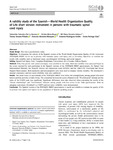Mostrar o rexistro simple do ítem
A validity study of the Spanish-World Health Organization Quality of Life short version instrument in persons with traumatic spinal cord injury
| dc.contributor.author | Salvador-De la Barrera, Sebastián | |
| dc.contributor.author | Mora-Boga, Rubén | |
| dc.contributor.author | Ferreiro-Velasco, María Elena | |
| dc.contributor.author | Seoane-Pillado, Teresa | |
| dc.contributor.author | Montoto Marqués, Antonio | |
| dc.contributor.author | Rodríguez-Sotillo, Antonio | |
| dc.contributor.author | Pértega-Díaz, Sonia | |
| dc.date.accessioned | 2024-02-02T07:28:55Z | |
| dc.date.issued | 2018 | |
| dc.identifier.citation | Salvador-De La Barrera S, Mora-Boga R, Ferreiro-Velasco ME, Seoane-Pillado T, Montoto-Marqués A, Rodríguez-Sotillo A, Pertega Díaz S. A validity study of the Spanish-World Health Organization Quality of Life short version instrument in persons with traumatic spinal cord injury. Spinal Cord. 2018 Oct;56(10):971-979. | es_ES |
| dc.identifier.issn | 1362-4393 | |
| dc.identifier.uri | http://hdl.handle.net/2183/35349 | |
| dc.description.abstract | [Abstract] Objectives: To determine the validity of the Spanish version of the World Health Organization Quality of Life instrument (WHOQOL-BREF) for its use in persons with traumatic spinal cord injury and, as secondary objectives, to correlate the results with variables such as functional status, psychological well-being, and social support. Setting: Spinal Cord Injury Unit, Complejo Hospitalario Universitario de A Coruña, Galicia (Spain). Methods: Fifty-four people with spinal cord injury were enrolled in this study. Relevant variables were analyzed based on the scores reported by each participant in the Spanish versions of the WHOQOL-BREF questionnaire, the Spinal Cord Independence Measure, the Hospital Anxiety and Depression Scale (HADS), and the Duke-UNC Functional and Social Support Questionnaire. Both parametric and non-parametric tests were used to compare various variables. The instrument's internal consistency and test-retest reliability were also confirmed. Results: The mean scores of each domain of the WHOQOL-BREF were lower, but nonsignificant, among people who need help to perform activities of daily living. The correlation between the scores obtained in the "Psychological" domain and the items of the HADS scale was significant. Significant differences were also observed when comparing the results of the "Social relationships" and "Environment" domains among people with low scores in the Duke questionnaire. Both an adequate consistency (Cronbach's α: 0.887) and test-retest reliability were demonstrated. Conclusion: The Spanish version of the WHOQOL-BREF questionnaire is useful and reliable to evaluate the quality of life of persons with spinal cord injuries in our population of Spanish-speaking people. | es_ES |
| dc.language.iso | eng | es_ES |
| dc.publisher | Springer Nature | es_ES |
| dc.relation.uri | https://doi.org/10.1038/s41393-018-0139-2 | es_ES |
| dc.rights | © International Spinal Cord Society | es_ES |
| dc.subject | Quality of life | es_ES |
| dc.subject | Spinal cord injuries | es_ES |
| dc.title | A validity study of the Spanish-World Health Organization Quality of Life short version instrument in persons with traumatic spinal cord injury | es_ES |
| dc.type | info:eu-repo/semantics/article | es_ES |
| dc.rights.access | info:eu-repo/semantics/embargoedAccess | es_ES |
| dc.date.embargoEndDate | 9999/99/99 | es_ES |
| dc.date.embargoLift | 9999 | |
| UDC.journalTitle | Spinal Cord | es_ES |
| UDC.volume | 56 | es_ES |
| UDC.startPage | 971 | es_ES |
| UDC.endPage | 979 | es_ES |
Ficheiros no ítem
Este ítem aparece na(s) seguinte(s) colección(s)
-
II - Artigos [695]






